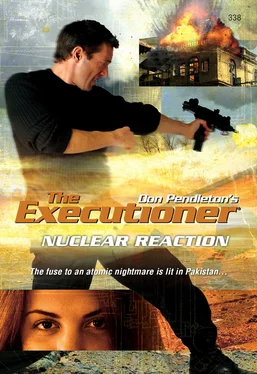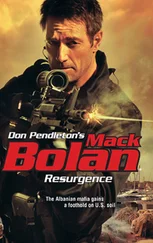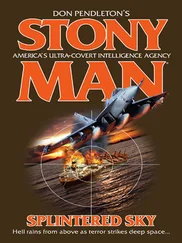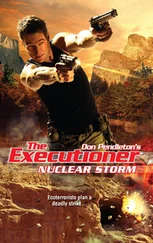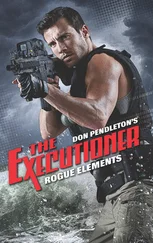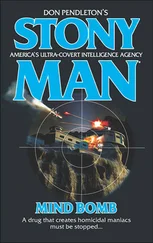No one saw the grenade coming, not until it landed on the broad hood of the second jeep with a resounding clang and wobbled for a heartbeat, as if making up its mind which way to go. The RGD-5 wasn’t round, and so its path was unpredictable. It bounced, then slipped into the small space left between the two jeeps, where the second one had rammed into the first.
Bolan hunched down and waited for the blast. Before it came, one of the soldiers recognized the danger. Calling out to his companions, he rose and turned to run. He wasn’t fast enough. The blast rocked both vehicles, its shrapnel taking down the would-be runner like a point-blank shotgun blast. It also burst the lead jeep’s fuel tank and ignited a spare can of gasoline on the rear deck of the passenger compartment, instantly enveloping both vehicles in flames.
Watching from cover, Bolan saw a handful of soldiers burst from cover, all of them on fire and beating at the flames with blistered hands. They ran instead of dropping to the ground and rolling, partly out of panic, and because the turf around them was on fire, as well. A lake of burning fuel surrounded them, allowing nowhere to go except a mad rush for the tree line that would offer no help, no shelter.
Bolan left them to it, ready with his automatic rifle as the other troops began to reassess their situation. Knowing they were all at risk, the soldiers redoubled the outpouring of their aimless fire into the forest, bullets flaying bark from tree trunks, clipping branches, ventilating leaves.
Bolan was relatively safe from being spotted, in those circumstances, but a stray round through the head or chest was just as deadly as a sniper’s well-aimed killing shot. He stayed low, took advantage of the cover, firing only when he had a target dead to rights and in the clear.
Where was Pahlavi? he wondered.
Never mind.
Survival was the first priority. If he could deal with the remaining soldiers and emerge alive, there would be time enough to look for his elusive contact. In the meantime, it was strictly do-or-die.
The jeeps were destroyed, but the Executioner heard the truck’s big engine cranking, as someone tried to get it started after stalling it.
Bolan rose and sighted on the cab. The soldiers surrounding it were firing wildly. His angle wasn’t optimal, he had no real view of the man in the driver’s seat, but he was lined up on the left-hand door. Taking a chance, he held the autorifle’s trigger down and used the last rounds in his magazine to ventilate that door, spraying the inside of the cab with sudden death.
The engine fell silent, and the troops around the truck’s cab scattered, seeking better shelter from the storm that had enveloped them. Reloading in a rush, Bolan moved on.
Darius Pahlavi was no longer terrified. Somehow, somewhere between the death of his two friends and his arrival in the forest clearing with Matt Cooper, he had passed from numbing fear to a sensation that he barely recognized.
Rage was a part of it, for all he’d lost and all his people had endured—the nightmare that they would endure, if he failed to complete his mission. There was guilt, as well, for leading Adi and Sanjiv into the trap that claimed their lives. He vowed to make amends with Adi’s wife and Sanjiv’s parents somehow, someday.
If he lived that long.
Right now, he had to focus on surviving for the next few minutes, which meant ducking bullets in the woods and doing everything he could to stop his enemies.
Kill them, Pahlavi silently corrected himself. It all came down to that. Kill or be killed.
He’d never shot a man before that afternoon—never shot at a man, in fact—and when it happened, the sheer deceptive ease of it surprised Pahlavi. He had practiced with the pistol earlier, knew how to aim and squeeze the trigger slowly, without jerking it, but mortal combat put a different slant on things.
His first shots, on the highway, had been wasted but for one that cracked the windshield of the jeep behind them. Too late, even then, to save his friends, but he’d felt a rush of satisfaction from the simple act of striking back.
It was a different thing, of course, to fire at living men on foot, instead of faceless autos on the highway, but it helped that these men were intent on killing him, had killed his friends already.
Cooper had taken down a number of the enemy already, firing with an automatic rifle, then contriving somehow to destroy their jeeps. Pahlavi found it horrible and fascinating, all at once, as if he had been dropped into the middle of some action film from Hollywood.
Except that there were real bullets whining around him, thunking into trees raising spouts of sod on impact with the ground. Real bullets, too, inside his pistol, waiting to be used against his foes.
Pahlavi found a vantage point where he could watch the soldiers. Several of them were hunkered down behind their truck, waiting for orders or an opportunity to move. Cooper had pinned them down, but he was somewhere on the other side. These troops apparently had no idea there was another enemy watching, on their side of the truck.
Pahlavi took his time, aiming, worried a bit that he was letting Cooper down by not advancing more aggressively. But he knew he would do the tall American no good at all if he was dead. Aiming, he framed a target in his sights as he’d been taught—but then the soldier moved, shifting away, duckwalking toward the rear of the truck. Cursing, Pahlavi tracked him, had him lined up when the soldier rose and stepped around the tailgate, rifle at his shoulder, squeezing off a burst toward the far side of the clearing.
Pahlavi squeezed the trigger, rode the sleek Beretta’s recoil, hopeful but still surprised to see his target crumple, back arched, slumping to the earth. The soldier writhed, convulsing, kicking at the sod, then shivered out and moved no more.
Pahlavi had expected nausea, a rush of guilt, something besides the mere sense of a job well done, but nothing came to him. Perhaps it was the moment, he decided, too much going on around him to permit normal emotions coming to the fore.
Or else, perhaps he liked it.
No. Pahlavi wouldn’t, couldn’t think about that now. There would be ample time to psychoanalyze himself if he survived this battle and the mission still to come.
And if he died, what difference would it make?
Soldiers were grouped around the man he’d shot, checking for vital signs. Some of them were firing aimlessly into the woods. They clearly had no sense of where the fatal shot had come from, meaning he could fire again, at least once more, with relative impunity.
Pahlavi chose another target, lined his sights up on the soldier’s chest, and let the hammer drop.
SACHI CHANDAKA HUDDLED underneath the truck and tried to understand exactly what was happening. He’d been pursuing four men, with a force of thirty-one behind him, and he’d seen two of them die. The others should be dead by now, as well, but instead his men were dying all around him, while he cowered in the shadows, trembling and in pain.
He had been splashed with burning fuel, along one sleeve and shoulder of his jacket, when the jeeps exploded moments earlier. Ducking and running to escape the shrapnel and clear the spreading lake of fire behind him, the lieutenant had been pulled down by two privates who smothered the flames and doubtless saved his life. Chandaka reckoned they should both receive citations for their courage and quick thinking, but from where he lay beneath the truck, he saw one of them stretched out dead, almost within arm’s reach.
His pain and fear immobilized Chandaka, shamed him. He knew he should find the strength to rally his remaining troops, lead them to victory, and thus salvage some shred of honor from this day—but how?
Читать дальше
